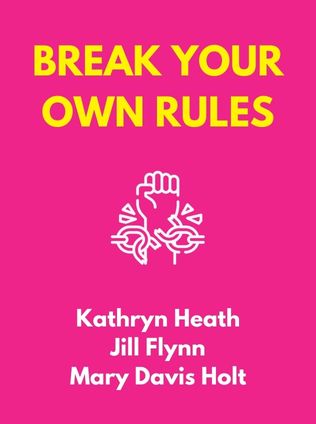
Break Your Own Rules
How to Change the Patterns of Thinking That Block Women’s Paths to Power
By Kathryn Heath, Jill Flynn, Mary Davis Holt
Published 09/2011
Break Your Own Rules: How to Change the Patterns of Thinking That Block Women's Paths to Power
By Jill Flynn, Kathryn Heath, and Mary Davis Holt
About the Author
Jill Flynn, Kathryn Heath, and Mary Davis Holt are the managing partners of Flynn Heath Holt Leadership (FHHL), a consulting firm dedicated to developing women leaders. Jill Flynn specializes in creating and implementing company-specific pipelines for high-potential women. Kathryn Heath is a developer of leadership programs, coach, and training designer, while Mary Davis Holt is an executive coach and keynote speaker on business, women, and leadership. Together, they have coached and trained over 5,000 women, helping them achieve high-powered corporate positions.
Main Idea
"Break Your Own Rules" distills the six faulty assumptions (or "rules") most women follow that hinder their progress, providing new rules to clear the path to executive roles. The authors reveal how women can change their thinking and behaviors to reach their full potential and revolutionize their workplaces, homes, and communities.
Table of Contents
- Introduction: Hidden Gold
- The Upside of Giving Up Control
- The New Rules of Open Leadership
- The Ten Elements of Openness
- Crafting Your Open Strategy
- Structuring Openness with Sandbox Covenants
- Orchestrating Your Open Strategy
- Redefining Relationships
- The Failure Imperative
- Starting the Transformation
Introduction: Hidden Gold
The authors start by sharing their vision of seeing women occupy at least 30 percent of the top leadership positions in corporate America within the next ten years. They argue that having more women in leadership roles will lead to better-led corporations and benefit everyone. The book is a call to action for women to reimagine leadership and strive for the top positions, supported by the new rules laid out in the book.
The Upside of Giving Up Control
This section discusses the benefits of giving up control and embracing openness. The story of Dave Carroll and United Airlines is used to illustrate how social media can amplify customer experiences and push companies to adopt more open policies. Carroll's viral video "United Breaks Guitars" forced United Airlines to change its baggage handling policies after his claim for a damaged guitar was initially denied.
"Openness requires more - not less - rigor and effort than being in control." - Charlene Li
This example underscores the importance of transparency and responsiveness in building trust and improving customer service.
The New Rules of Open Leadership
Li outlines new rules for open leadership, emphasizing the importance of respecting the power of customers and employees, sharing constantly to build trust, nurturing curiosity and humility, holding openness accountable, and forgiving failure. These principles help leaders navigate the balance between openness and control.
"Having the confidence and humility to give up the need to be in control while inspiring commitment from people to accomplish goals." - Charlene Li
These new rules include:
- Respect that your customers and employees have power.
- Share constantly to build trust.
- Nurture curiosity and humility.
- Hold openness accountable.
- Forgive failure.
The Ten Elements of Openness
Openness is divided into two broad categories: information sharing and decision making. The six elements of information sharing include explaining, updating, conversing, open mic, crowdsourcing, and platforms. The four elements of decision making are centralized, democratic, self-managing, and distributed.
Sign up for FREE and get access to 1,400+ books summaries.
You May Also Like
The Subtle Art of Not Giving a F*ck
A Counterintuitive Approach to Living a Good Life
By Mark MansonRich Dad Poor Dad
What the Rich Teach Their Kids About Money - That the Poor and Middle Class Do Not!
By Robert T. KiyosakiHow To Win Friends and Influence People
The All-Time Classic Manual Of People Skills
By Dale CarnegieQuiet: The Power of Introverts
The Power of Introverts in a World That Can't Stop Talking
By Susan Cain



















